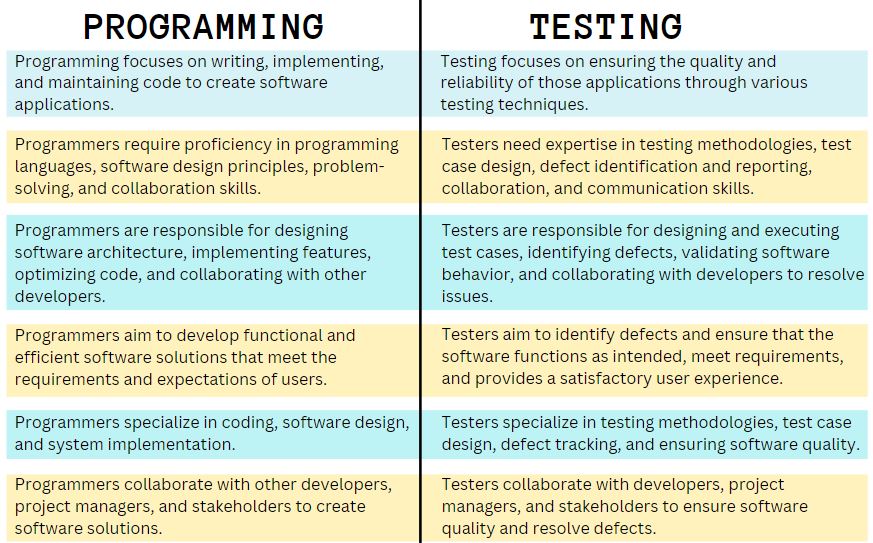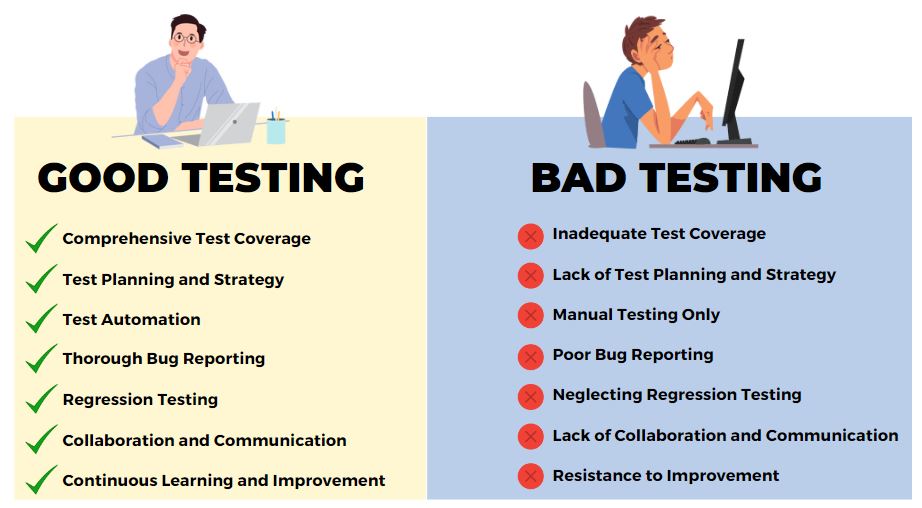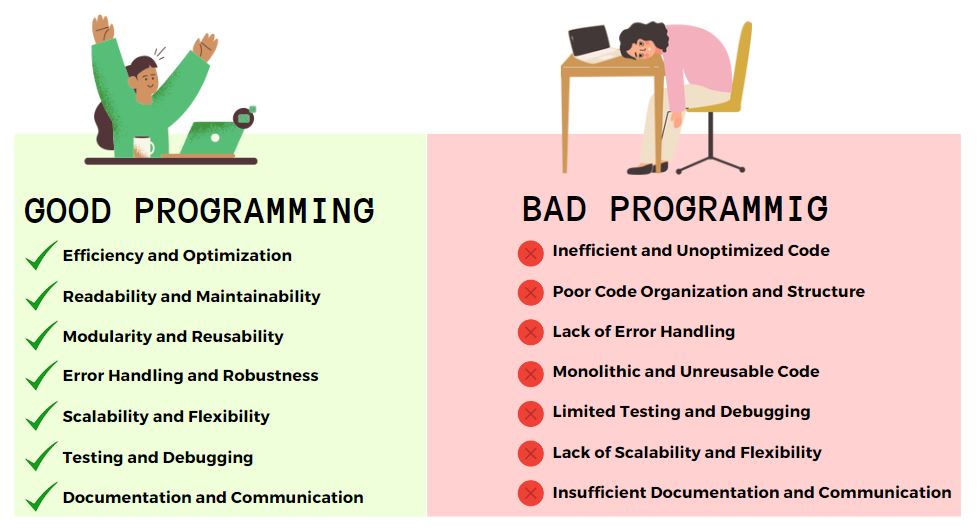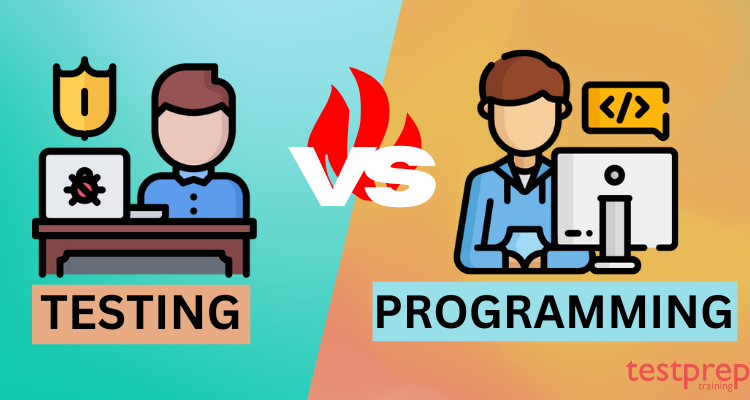In the ever-evolving landscape of software development, two crucial skill sets stand out as pillars of success: Good Testing Skills and Good Programming Skills. While both are essential components of delivering high-quality software, they occupy distinct roles in the development process. Good Programming Skills empower developers to craft robust and efficient code, bringing a product’s vision to life. On the other hand, Good Testing Skills serve as the guardians of quality, ensuring that the code functions as intended and remains resilient in the face of real-world challenges. In this exploration, we’ll delve into the nuances of each skill set, their unique contributions, and how they harmonize to create software that not only works but excels.
In this blog post, we will understand the resemblances and disparities between good testing skills and good programming skills, considering the perspectives of both developers and testers. We will explore the unique attributes of each skill set, their respective functions in the software development process, and how they contribute to the overall triumph of a project.
Overview: Programming and Testing Skills
Testing skills encompass a diverse range of knowledge and abilities that empower testers to identify defects, validate functionality, and ensure the quality of software. They entail a deep understanding of various testing methodologies, the ability to design effective test cases, and proficiency in utilizing specialized testing tools and frameworks. In this blog post, we will explore practical applications of testing skills and underscore their significance within the software development landscape, particularly for testers.
On the other hand, programming skills form the core of a developer’s role, as they are responsible for writing and maintaining the code that drives applications. Good programming skills encompass expertise in programming languages and frameworks, a strong grasp of software design principles and patterns, and the ability to create code that is clean, efficient, and easy to maintain. We will delve into real-world applications of programming skills and discuss their importance from the perspective of developers.
It is essential to recognize the distinct yet interconnected roles of developers and testers in the software development process. Developers focus primarily on crafting code, while testers emphasize ensuring the software’s quality and reliability. Throughout this blog post, we will explore the unique perspectives of developers and testers, highlighting scenarios where one set of skills may take precedence over the other and the value that each role brings to the table.
Furthermore, effective collaboration between developers and testers is paramount for delivering high-quality software. We will delve into the interdependence between these roles, shed light on the benefits of collaboration, and explore how developers and testers can leverage each other’s skills and expertise to create superior products. Striking a balance between testing skills and programming skills is key to achieving this collaborative synergy.

What are Good Testing Skills?
In the rapidly evolving world of software development, ensuring the quality and reliability of software applications is of utmost importance. This is where proficient testing skills come into play. Testing is a critical component of the software development lifecycle, aimed at identifying defects, validating functionality, and ultimately ensuring that the software meets the desired requirements.
Let’s explore the crucial aspects of good testing skills and their relevance in the software development landscape.
Understanding of Testing Methodologies
Good testers possess a solid grasp of various testing methodologies, such as unit testing, integration testing, system testing, and acceptance testing. Each methodology focuses on specific aspects of the software and employs different techniques to uncover defects. With expertise in these methodologies, testers can choose the most appropriate approach for a given situation, ensuring comprehensive testing coverage.
Effective Test Case Design
Designing effective test cases is a fundamental skill for testers. Good testing skills encompass the ability to create test cases that cover a wide range of scenarios, including positive and negative test cases, edge cases, and boundary conditions. Testers should have a keen eye for detail and the ability to identify potential areas of failure. Well-designed test cases enhance the likelihood of detecting defects and provide valuable insights into the software’s behavior.
Accurate Test Execution and Reporting
An essential aspect of testing skills is the ability to execute test cases accurately and efficiently. Testers must follow testing procedures, record test results, and report any anomalies or issues encountered during testing. This includes documenting steps to reproduce defects and providing clear and concise reports to developers for further investigation and resolution.
Proficiency in Testing Tools and Frameworks
Testers are proficient in using a variety of testing tools and frameworks. These tools automate test execution, manage test data, and generate comprehensive reports. Examples include popular testing frameworks like Selenium for web applications or JUnit for unit testing. Testers who are adept at using these tools can streamline the testing process, increase efficiency, and improve test coverage.
Collaboration and Communication Skills
Testers should possess strong collaboration and communication skills to effectively interact with developers, project managers, and other stakeholders. Clear communication helps in understanding requirements, clarifying ambiguities, and conveying testing progress and results. Collaboration ensures that testing aligns with development goals and fosters a cooperative environment for resolving issues.
Continuous Learning and Adaptability
Testing is an ever-evolving field, and good testers are committed to continuous learning. They stay updated with the latest testing techniques, tools, and industry trends. Testers with good testing skills adapt to changing project requirements, technological advancements, and emerging testing methodologies. Their ability to embrace new approaches and technologies enhances their effectiveness in ensuring software quality.

What are Good Programming Skills?
From the perspective of a developer, possessing strong programming skills is essential in under software development. Developers bear the responsibility of writing, implementing, and maintaining the code that forms the foundation of software applications. Let’s explore the significance of good programming skills for developers and how they contribute to the overall success of software development projects.
Efficient Coding and Productivity
Good programming skills empower developers to write code efficiently and effectively. They possess a deep understanding of programming languages, frameworks, and tools, enabling them to select the most appropriate solutions for implementing desired features. Developers with strong programming skills can create code that is concise, modular, and maintainable, resulting in increased productivity and reduced development time.
Software Design and Architecture
Developers comprehend how to structure code and design software components to ensure scalability, extensibility, and reusability. By adhering to design principles and patterns such as SOLID (Single Responsibility, Open-Closed, Liskov Substitution, Interface Segregation, and Dependency Inversion), developers produce well-organized code that is adaptable to changing requirements.
Debugging and Troubleshooting
Good programming skills encompass the ability to effectively debug and troubleshoot issues in code. Developers proficiently utilize debugging tools, analyze error logs, and identify the root causes of problems. They can efficiently trace and rectify bugs, ensuring the stability and reliability of the software. Strong debugging skills aid developers in maintaining code quality and delivering bug-free applications.
Performance Optimization
Developers possess a profound understanding of algorithms, data structures, and best practices for efficient code execution. By analyzing and optimizing critical code sections, they can enhance the overall performance of the software, resulting in faster response times and improved user experiences.
Working with Team
Good programming skills facilitate effective collaboration and teamwork within development teams. Developers can clearly communicate their code intentions, adhere to coding standards, and seamlessly integrate their work with others. They actively participate in code reviews, provide constructive feedback, and help maintain a high standard of code quality throughout the project. Collaboration among developers ensures consistent and cohesive software development.

Collaboration of Developers and Testers
Collaboration and synergy between developers and testers are key to delivering exceptional software solutions. Developers and testers bring unique skill sets and perspectives to the table, and when they work together effectively, they can create high-quality software that meets user expectations. Let’s explore the importance of collaboration and the synergy between developers and testers in the software development process.
1. Early Defect Detection
Testers with their expertise in testing methodologies and test case design can identify defects early in the development cycle, allowing developers to address them promptly. By working closely together, developers gain valuable insights into potential vulnerabilities and can proactively make improvements to the code, resulting in higher-quality software.
2. Requirement Understanding and Validation
Developers and testers collaborate to ensure a comprehensive understanding and validation of requirements. Testers, through their expertise in testing, can provide valuable input during requirement gathering and analysis, helping to identify potential ambiguities or gaps. Developers, in turn, can seek clarification from testers and ensure that they have a clear understanding of the expected behavior. This collaborative effort ensures that the software meets the desired requirements.
3. Effective Bug Reporting and Resolution
Testers play a crucial role in reporting bugs and defects to developers. Clear and concise bug reports provided by testers enable developers to understand the issues quickly and accurately. Developers, with their programming skills, can efficiently analyze the reported defects and propose appropriate solutions. Collaborating on bug resolution ensures that issues are addressed effectively, resulting in improved software quality.
4. Knowledge Sharing and Mutual Learning
Collaboration between developers and testers fosters knowledge sharing and mutual learning. Developers can gain insights into testing techniques, methodologies, and tools from testers, enhancing their understanding of the testing process. Similarly, testers can benefit from developers’ knowledge of code implementation, software design principles, and programming best practices. This mutual exchange of knowledge enhances the skills of both developers and testers, leading to continuous improvement.
5. Agile and Iterative Development
The close interaction between the two roles ensures that testing is integrated into the development process, allowing for faster feedback loops and shorter release cycles. Developers and testers collaborate on incremental development, testing, and quality assurance, resulting in more efficient and high-quality software delivery.
6. User-Centric Approach
Testers represent the end user’s perspective and advocate for their needs and expectations. By collaborating with testers, developers gain valuable insights into user requirements, pain points, and usability concerns. This collaboration helps in creating software that provides a seamless and satisfactory user experience.
Ideal Skill Sets for Developers and Testers
Striking the right balance between these skill sets is essential for fostering collaboration, efficient problem-solving, and delivering exceptional software. Let’s explore the ideal skill sets for developers and testers and how they contribute to the overall software development process.
Ideal Skill Sets for Developers:
Proficiency in Programming Languages:
Developers should have a strong command of one or more programming languages relevant to the project, such as Java, Python, C++, or JavaScript. Proficiency in programming languages allows developers to write clean, efficient, and maintainable code.
Software Design and Architecture:
Developers need a solid understanding of software design principles, patterns, and architectural concepts. This includes knowledge of design patterns (e.g., MVC, Singleton) and architectural patterns (e.g., microservices, layered architecture) to create scalable, modular, and extensible software systems.
Problem-Solving and Analytical Thinking:
Developers should possess strong problem-solving and analytical thinking skills. They should be able to analyze complex problems, break them down into manageable tasks, and devise effective solutions. This skill helps developers overcome challenges and implement innovative features.
Version Control and Collaboration:
Proficiency in version control systems, such as Git, is crucial for developers. They should be adept at branching, merging, and resolving conflicts. Collaboration skills enable developers to work effectively in teams, participate in code reviews, and maintain code quality.
Ideal Skill Sets for Testers:
Testing Methodologies and Techniques:
Testers should be well-versed in various testing methodologies, such as black-box testing, white-box testing, and exploratory testing. They should have a deep understanding of testing techniques, such as boundary value analysis, equivalence partitioning, and regression testing.
Test Case Design and Execution:
Testers should have the ability to design comprehensive test cases that cover different scenarios, edge cases, and user workflows. They should be skilled in test case execution, result analysis, and defect tracking.
Defect Identification and Reporting:
Testers should be proficient in identifying defects, reproducing them, and documenting them in a clear and concise manner. They should effectively communicate the severity and impact of defects to help developers understand and resolve them.
Testing Tools and Automation:
Testers should be familiar with testing tools and frameworks that facilitate test automation, test management, and defect tracking. Knowledge of tools like Selenium, JUnit, TestNG, or Jira can significantly enhance testing efficiency and accuracy.
Communication:
Testers should possess excellent collaboration and communication skills to effectively interact with developers, project managers, and stakeholders. They should actively participate in discussions, provide valuable feedback, and contribute to improving the overall quality of the software.
Domain Knowledge and User Perspective:
Testers should have a good understanding of the domain in which the software operates. This knowledge allows them to test the software from the end-users perspective, identify usability issues, and ensure that the software meets user expectations.
Job Roles and Areas: Programming vs Testing
Programming and testing are two distinct job roles with different areas of focus. Let’s explore the job roles and areas associated with programming and testing to understand their unique responsibilities and contributions.
Programming:
1. Software Developer/Programmer:
Software developers or programmers are responsible for writing, implementing, and maintaining the code that forms the foundation of software applications. They typically work with programming languages, frameworks, and tools to develop software solutions. Their key responsibilities include:
- Writing clean, efficient, and maintainable code.
- Designing software architecture and components.
- Implementing features and functionalities based on requirements.
- Debugging and troubleshooting issues in the code.
- Optimizing code for performance and scalability.
- Collaborating with other developers and stakeholders.
2. Full-stack Developer:
Full-stack developers have the skills to work on the client-side (front end) as well as the server-side (back end) of software applications. Their responsibilities include:
- Using HTML, CSS, and JavaScript for developing user interfaces.
- Building backend functionality with server-side languages (e.g., Python, Java, Ruby).
- Integrating frontend and backend components to create cohesive applications.
- Managing databases and data storage.
- Ensuring smooth communication between the front end and back end.
3. Software Engineer:
Software engineers focus on the broader aspects of software development, including analysis, design, development, testing, and maintenance. They work on complex software systems and often collaborate with other professionals to deliver robust and scalable software solutions. Their responsibilities include:
- Conducting requirements analysis and system design.
- Writing code and implementing software components.
- Performing unit testing and debugging.
- Collaborating with cross-functional teams.
- Following software development best practices and methodologies.
- Ensuring software quality and reliability.
Testing:
1. Software Tester:
Software testers design and execute test cases, identify defects, and validate the software against specified requirements. Their key responsibilities include:
- Planning and executing test cases and test scenarios.
- Identifying and documenting software defects.
- Performing functional, integration, and system testing.
- Validating software behavior against requirements.
- Conducting regression testing to ensure code changes do not introduce new issues.
- Working with developers and stakeholders to resolve defects.
2. Quality Assurance (QA) Engineer:
QA engineers focus on the overall quality of software applications. They develop and implement testing strategies, define quality standards, and ensure adherence to best practices. Their responsibilities include:
- Developing test plans and strategies.
- Defining quality metrics and standards.
- Conducting manual and automated testing.
- Performing risk analysis and mitigation.
- Continuously monitoring and improving the quality assurance process.
- Collaborating with developers, testers, and project managers to ensure high-quality software.
3. Test Automation Engineer:
Test automation engineers specialize in automating test cases and building testing frameworks to improve testing efficiency and effectiveness. Their responsibilities include:
- Developing and maintaining test automation frameworks.
- Creating automated test scripts using tools and frameworks.
- Executing automated tests and analyzing results.
- Merging test automation into the software development process.
- Collaborating with developers and testers to identify test automation opportunities.
Final Words
Both programming and testing play crucial roles in delivering high-quality software applications. While programming focuses on creating software solutions through code implementation, testing ensures the quality and reliability of those solutions through rigorous testing methodologies.
Developers, with their expertise in programming languages, software design, and problem-solving, bring software applications to life. Their responsibilities encompass coding, system implementation, and optimization to create functional and efficient software solutions.
On the other hand, testers specialize in testing methodologies, test case design, defect identification, and validation. They play a vital role in ensuring that the software meets requirements, functions as intended, and provides a satisfactory user experience. Testers collaborate closely with developers, project managers, and stakeholders to identify and resolve defects, contributing to the overall quality of the software.
Effective collaboration between developers and testers leads to early defect detection, comprehensive requirement validation, efficient bug resolution, knowledge sharing, and a user-centric approach to software development. Ultimately, the combination of strong programming skills and good testing skills is essential for delivering high-quality software that meets the needs of users, ensures reliability, and achieves success in the competitive software development landscape.



